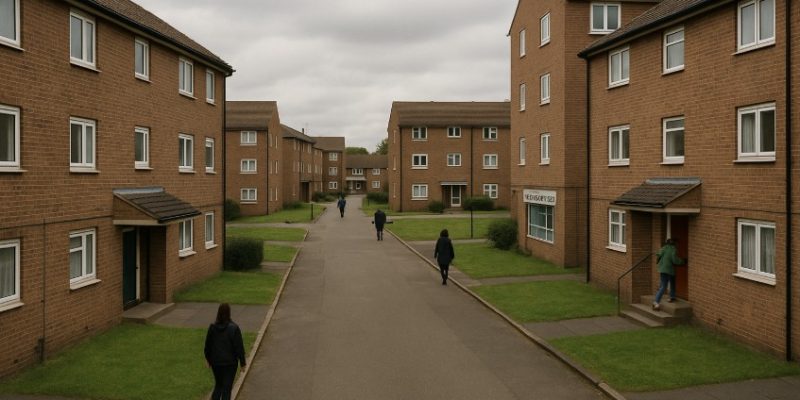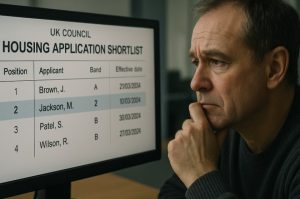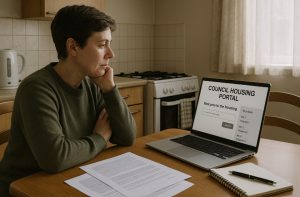
2nd Position Bidding for Council House: What It Means and How It Works?
Securing a council house in the UK can be a lengthy and often uncertain process. For many applicants, being told they are in “2nd position” for a property raises questions about what this means for their chances.
This article explains the concept of second position bidding, how the council house bidding system works, and what applicants can expect if they find themselves next in line for a property.
What Does Being in 2nd Position Mean in Council House Bidding?

Being in second position for a council house indicates that your application is ranked just below the most eligible bidder.
When someone places a bid on a council property, they are placed in a shortlist alongside other applicants.
The local authority then organises this list based on a variety of criteria including housing need, length of time on the housing register, and eligibility for that specific property.
If you are in second place, it means that someone else met the criteria slightly more closely or has a higher level of priority, often due to more urgent housing needs or an earlier registration date within the same band.
It’s important to note that your actual bid is not simply assessed by when it was submitted but rather on how well you meet the local authority’s housing criteria.
Being second is not a guarantee of an offer, but it does put you in a strong position should the first applicant be ineligible or refuse the property.
How Does the Council House Bidding Process Work?
The council house bidding system is designed to ensure fair and transparent allocation of social housing.
It operates under the Choice Based Lettings (CBL) model, used by most UK local authorities, where applicants bid on available properties through an online portal.
This system gives applicants some choice and control over where they might live, within the limitations of their assessed housing need and local housing availability.
Property Advertisement Phase
Local councils and housing associations publish their available properties on dedicated housing portals. These adverts typically include:
- Property type and number of bedrooms
- Location and accessibility features
- Eligibility requirements (e.g. household size, age restrictions, disability adaptations)
- Tenancy type and landlord information
Properties are usually listed for a defined period—commonly between three and seven days—during which applicants can express interest by placing a bid.
Submission of Bids by Eligible Applicants
During the bidding window, applicants are encouraged to place bids on properties that match their needs and for which they meet the eligibility criteria.
Most councils allow three active bids at any one time, although this may vary depending on the local policy.
Bidding does not involve offering money. Instead, it’s a way to indicate interest in a property.
Applicants must ensure that their bids are carefully considered, as placing bids on unsuitable homes can lead to delays or unsuccessful offers.
Generation of Priority Shortlists
Once the bidding period closes, the local authority system automatically ranks all submitted bids. The ranking is based on multiple factors:
- Applicant’s housing need band
- Registration or effective date
- Suitability for the property
This process creates a priority shortlist for each property, with the most eligible applicant at the top.
Offer and Verification Stage
The applicant ranked first is contacted with a provisional offer. They are required to:
- Provide up-to-date documentation
- Attend a property viewing
- Pass eligibility checks (e.g. rent history, income assessment)
If they meet all conditions and accept the property, the process concludes. However, if the offer is refused, the council moves to the next eligible applicant on the list.
Reoffering to the Next Shortlisted Applicant
Should the top-ranked applicant decline or fail the verification checks, the council offers the property to the next highest-ranked applicant.
This typically happens quickly to prevent delays in tenancy start dates. The second-position bidder then undergoes the same checks and is offered the property if successful.
What Happens If the First Bidder Declines the Offer?

If the first applicant turns down the offer or is deemed ineligible during verification, the property is not put back up for open bidding.
Instead, it is automatically offered to the next most suitable applicant on the shortlist, which is the person in second position.
Common reasons the first bidder may not accept the offer include:
- Failure to meet the eligibility criteria listed in the property advert
- Accumulated rent arrears with their current landlord
- A recent history of antisocial behaviour
- Personal preference or change in circumstances
Councils usually give the top applicant a deadline to respond. If no response is received or the applicant refuses the property, the council will contact the next eligible person.
At this stage, the second position bidder is asked to provide documentation or attend a viewing, depending on the council’s procedures.
This process is time-sensitive, and applicants are generally expected to respond quickly to avoid losing their position on the list.
Which Factors Influence Your Bidding Position?
Your position on a council housing shortlist is not determined solely by when you bid but rather by a set of well-defined criteria assessed by the local authority.
These criteria are intended to reflect both housing need and fairness, ensuring that properties go to those with the most urgent requirements or longest waiting times.
Banding and Housing need Assessment
The most important factor influencing your bid position is the priority band assigned to you.
Each council uses a banding system to categorise applicants based on their housing needs. The banding typically ranges as follows:
- Band A – Emergency or urgent need (e.g. homelessness, critical medical condition)
- Band B – High need (e.g. overcrowding, risk of domestic abuse)
- Band C – Moderate need (e.g. living with parents, moderate medical issues)
- Band D – Low or no assessed need
Applicants in higher bands are given greater priority in the bidding process. The housing need assessment is usually carried out at the time of application and reviewed periodically or when circumstances change.
Effective Date on the Housing Register
If two or more applicants fall within the same band, their position is further refined by the date they joined the housing register, often referred to as the effective date.
The applicant who has been waiting longer will usually be placed higher on the shortlist.
This ensures fairness among applicants with similar levels of need and rewards those who have been on the list for an extended period.
Suitability for the Property
Each advertised property may have specific suitability criteria outlined in the listing. These may include:
- Number of bedrooms required
- Medical needs for adaptations (e.g. stair-free access)
- Age restrictions (e.g. properties designated for older adults)
- Household composition (e.g. families, single applicants)
Applicants must meet these suitability requirements to be shortlisted. If an applicant bids on a property for which they do not meet the criteria, their application will not be considered, regardless of their band or registration date.
Local Connection and Residency Rules
Many councils apply local connection policies to prioritise applicants who live, work, or have close family in the area. This means:
- Preference may be given to applicants with a proven local connection
- Some properties may be restricted to residents of specific neighbourhoods or boroughs
- Applicants without a local connection may still apply but are placed lower in the shortlist
The definition of a local connection can vary by council, but generally includes continuous residence for a minimum of six to twelve months or employment within the local authority area.
History of Previous Housing Offers
In some councils, previous refusals or offers may also impact your position. Frequent or unreasonable refusals may result in:
- Reduced priority or movement to a lower band
- Temporary suspension from bidding
- Requirement to reapply or attend housing support sessions
Although this is not a primary factor in bid ranking, it can affect overall application status and should be considered by applicants with multiple rejections.
Does Being Second Mean You’ll Get the Property?
Being second in the shortlist means that you are the next most suitable candidate if the top bidder does not proceed.
However, this is not a guaranteed offer. Several variables can affect whether the property eventually becomes available to you.
Factors influencing whether a second-position bidder receives an offer:
- The top-ranked applicant completes the required checks and signs the tenancy
- Your own eligibility is confirmed during verification
- Property-specific criteria such as income limits or household size
Applicants in second position are often advised to be prepared in case they are contacted.
This includes having documentation ready, being available for viewings, and responding promptly to council communication.
Second position should be viewed as a positive indication of your eligibility and status on the register.
While not definitive, it reflects that your circumstances are being taken seriously and that you’re close to securing a property.
Is There a Penalty for Refusing a Council House Offer?

Refusing a council property is allowed under most housing schemes, but multiple or repeated refusals can lead to consequences depending on the local authority’s policies.
Councils aim to allocate properties efficiently and do not encourage applicants to bid on homes they are not genuinely interested in.
Acceptable reasons for refusal may include:
- The property is unsuitable due to medical or accessibility issues
- The location is impractical for employment or schooling
- The size of the property does not meet the household’s needs
However, repeated refusals without valid reasons may result in:
- Downgrading your band status
- Temporary suspension from bidding
- Requirement to attend housing advice sessions
To avoid penalties, applicants should carefully assess the suitability of each property before bidding and review the full details in the advert.
How Can You Improve Your Position on the Housing List?
Improving your chances in the council housing bidding process often depends on providing accurate, up-to-date information and taking proactive steps to communicate your circumstances to the housing authority.
Practical ways to improve your bidding position include:
- Updating your application if your housing need changes (e.g. medical condition, family size)
- Providing supporting evidence, such as GP letters or occupational health reports
- Requesting a reassessment if you feel you qualify for a higher band
- Bidding more flexibly by considering different property types or locations
It’s also recommended to regularly log in to the housing portal, monitor new listings, and bid consistently. This ensures your application stays active and increases your visibility during each cycle.
What Should You Do While Waiting for an Offer?

Waiting for a council house offer can take months or even years depending on your banding and local housing demand.
During this period, it’s important to keep your application current and maintain readiness for potential contact.
Here are a few strategies:
- Log in weekly to check for new listings
- Only bid on properties that meet your needs and preferences
- Keep your contact details up to date with the council
- Respond to any correspondence promptly
- Prepare necessary documents like ID, proof of income, and medical letters
Some councils may also offer workshops or drop-in sessions where applicants can receive advice on making more effective bids or understanding their housing options.
Taking advantage of these resources can improve your chances of receiving an offer in future bidding cycles.
Conclusion
Being in second position for a council house puts you in a favourable spot, but it’s important to understand that this does not guarantee an offer.
Your position is determined by a combination of banding, time on the register, and meeting eligibility criteria not by the speed or frequency of your bids.
Applicants should keep their expectations realistic, maintain active engagement with the bidding system, and take steps to improve their housing situation where possible.
Second place may not always result in success, but it’s often a sign that you’re close.
Frequently Asked Questions
How do I know if I’m second on a council house bid?
Most councils don’t notify applicants of their exact position, but you can sometimes find out by contacting your housing officer after the bidding cycle ends.
Can two people be in the same second position?
No, councils use a strict ranking system. If two applicants have similar profiles, the one with the earlier registration date is prioritised.
How long does it take for the council to offer the property to the second bidder?
Usually within a few working days after the first offer is declined or fails. This can vary depending on the local authority’s process.
Will I be notified if I don’t get the property?
In many cases, councils do not contact unsuccessful bidders. It’s advisable to check the status of your bids via your housing account or by contacting the housing team.
Can I bid again if I was second and didn’t get the property?
Yes, you can continue to bid for other properties each week unless your application is suspended for another reason.
Does being in a higher band guarantee first position?
Not necessarily. Within each band, time on the housing register, property suitability, and local connection still play key roles.
How can I find out why my bid wasn’t successful?
You can request feedback from your council, which may give insights into how your application compares to others and whether changes are needed.
1. 2nd Position Bidding for Council House: What It Means and How It Works
Prompt:
A realistic wide-angle image of a UK council housing estate with multiple low-rise brick buildings, people walking or entering homes, overcast sky, and subtle signage for a housing office in the background. The scene should convey the idea of government housing and community living, focusing on order and process.
2. What Does Being in 2nd Position Mean in Council House Bidding?
Prompt:
A realistic wide-aspect image showing a housing application shortlist displayed on a computer screen in a UK council office. The list should highlight a fictional applicant in second place. In the foreground, a thoughtful middle-aged person looks at the screen, representing waiting and uncertainty.
3. What Happens If the First Bidder Declines the Offer?
Prompt:
A realistic wide-angle image of a council housing officer at a desk reviewing documents, with a vacant flat behind them. A folder marked “DECLINED” lies on the desk. In the background, a new applicant is being called in, representing the reoffering process.
4. Is There a Penalty for Refusing a Council House Offer?
Prompt:
A realistic wide-aspect image of a concerned applicant speaking to a council housing officer across a desk. Paperwork titled “Offer Refused” is on the table. The setting is a UK council office with official housing posters on the wall, showing tension but also procedural fairness.
5. What Should You Do While Waiting for an Offer?
Prompt:
A realistic wide-aspect image of a person sitting at a kitchen table in a modest UK home, checking a council housing portal on a laptop. Documents and a notebook are on the table. The expression should reflect patience and preparedness, suggesting the waiting phase.





